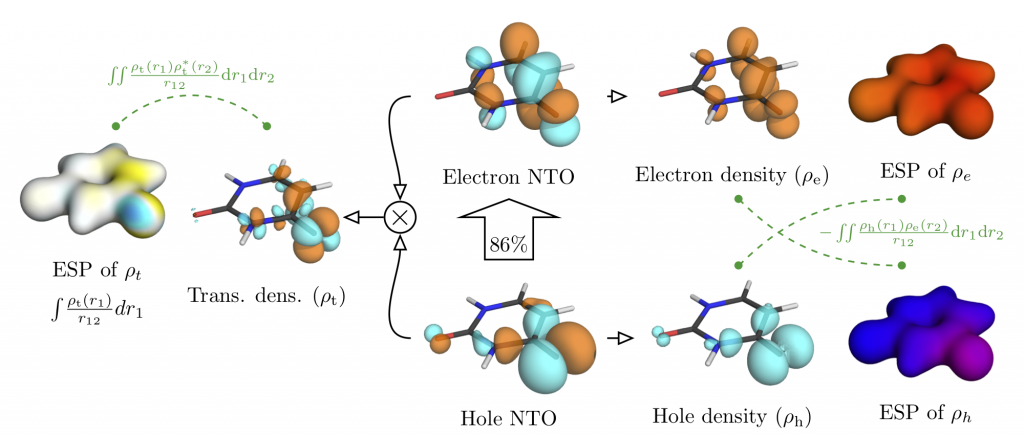Yesterday, Felix gave a seminar talk at Imperial College, London. Title: Understanding excited states of functional molecules beyond the molecular orbital picture.
You can download the slides here:
Tomorrow Felix will give a talk at the New Horizons in Materials Modelling 2020 taking place in York. Title: A toolbox for analysing structure-property relationships in functional molecules interacting with light.
You can download the slides here:
Tomorrow, Felix will give a talk at the Zernike Institute for Advanced Materials, Groningen. The talk is entitled: Understanding electronic excitation energies within and beyond the molecular orbital picture. It discusses how we can understand excited-state energies beyond simply looking at orbitals and their energies.

You can download the talk here:
On Thursday, 20/06, Felix will give a talk at the CECAM workshop on Theoretical and Computational Inorganic Photochemistry in Toulouse. This talk will discuss how excited states in transition metal complexes can be assigned completely automatically without ever looking at an orbital. It is shown how this method can be used for a high-throughput analysis of excited states as well as for benchmarking excited-state computations. Finally, a quick outlook will be given on how correlation effects can be visualised using a newly developed tool for computing conditional electron/hole densities.
You can download the slides here:
This week Felix will give a seminar talks at Marseille and Montpellier entitled”New Tools for Computational Photochemistry: Wavefunction Analysis and Dynamics.” The talk briefly summarises a number of computational methods developed.
Wavefunction analysis methods:
Methods for nonadiabatic dynamics simulations:
You can download the slides here:
Tomorrow, Felix will give a talk at the Computational Molecular Science Meeting in Warwick: “Understanding ionic and covalent wavefunction character without valence bond theory”.
The talk presents some new ideas on a long-standing question in computational chemistry, the connection between valence-bond theory and molecular orbital theory. In particular, the talk will be explore how two concepts from valence-bond theory, ionic and covalent wavefunction character, can be reconstructed from general quantum chemistry computations performed in the molecular orbital picture. The talk is based on the following paper in ChemPhotoChem.
You can download the slides here:
Tomorrow, Felix will give a seminar talk at the University of Nottingham – “New Tools for Computational Photochemistry: Wavefunction Analysis and Dynamics.” The talk briefly summarises a number of computational methods developed.
Wavefunction analysis methods:
Methods for nonadiabatic dynamics simulations:
You can download the slides here:
On 5 September, Felix Plasser will give a talk entitled “Transition Metal Complex Excited States: Turning Numbers into Chemical Insight” at the Quantum-Bio-Inorganic Chemistry Conference IV in Bath. The talk will discuss the automatic assignment of excited-state character for transition metal complexes and present some recent results about using conditional electron densities for visualising excited-state correlation effects.
You can download the slides here:
On 29 August, Felix Plasser will give a talk entitled “Analysis of Excited-State Computations: Turning Numbers into Chemical Insight” at the 7th EuCheMS Chemistry Congress in Liverpool. The talk will present an automatic analysis of thousands of excited states in the case of interacting DNA nucleobases and introduce a method for analysing electron correlation effects in real space, exemplified in the case of a conjugated polymer.
You can download the slides here:
On 3 June 2018, Felix Plasser gave a talk entitled “Analysis of Excited-State Computations: Turning Numbers into Chemical Insight” at the Midlands Computational Chemistry Meeting 2018 at Nottingham Trent University. You can download the slides here: